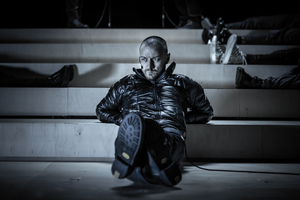Review: CYRANO DE BERGERAC, Playhouse Theatre
|
![]() When you enter a theatre to a soundtrack of Stormzy and open the programme to see a Beatboxer listed on the credits, you know that this is probably not a traditional staging of a nineteenth century play. Much anticipation has been building for Martin Crimp's new adaptation of Cyrano de Bergerac. Directed by Jamie Lloyd and starring James McAvoy, this magnificent show has stardust sprinkled all over it.
When you enter a theatre to a soundtrack of Stormzy and open the programme to see a Beatboxer listed on the credits, you know that this is probably not a traditional staging of a nineteenth century play. Much anticipation has been building for Martin Crimp's new adaptation of Cyrano de Bergerac. Directed by Jamie Lloyd and starring James McAvoy, this magnificent show has stardust sprinkled all over it.
 Edmond Rostand's play was written in 1897, but many will know the story from the incredibly popular 1990 French film starring Gérard Depardieu. A swashbuckling tale of love, self-doubt and bravery, Cyrano de Bergerac is a soldier of brilliant wit and gallantry who feels he can never declare his love for his distant cousin Roxane due to his insecurity about the size of his nose.
Edmond Rostand's play was written in 1897, but many will know the story from the incredibly popular 1990 French film starring Gérard Depardieu. A swashbuckling tale of love, self-doubt and bravery, Cyrano de Bergerac is a soldier of brilliant wit and gallantry who feels he can never declare his love for his distant cousin Roxane due to his insecurity about the size of his nose.
Instead, he decides to speak through Christian, a handsome but rather dim fellow soldier, to woo her by penning exquisite love letters for Christian to send to Roxane. When Christian dies in battle, Cyrano maintains the pretence for Roxane's sake, but it is only when he himself is mortally wounded that Roxane discovers the tragic truth.
Much is often made of huge film and TV stars gracing the West End stage and the result is sometimes less than fulfilling. James McAvoy appears here as the noble Cyrano and is simply breathtaking. He begins the performance in a slightly more aggressive and surly manner, but then relaxes into an incredibly natural, intelligent, witty and sharp performance. He achieves many layers within the voice of the character; from the spiky repartee between soldiers to the sensitive words of a man deeply in love.
The highlight of the entire play is the scene where Cyrano speaks for Christian to Roxane. McAvoy sits forward on his chair, looking out to the audience and imitating Christian's voice and accent perfectly. Initially it is very funny, but then delicately morphs into an incredibly beautiful, moving and erotically charged soliloquy, spoken without ego, just with pure emotion. McAvoy has the entire audience in the palm of his hand.
Many will come just to see McAvoy, but the rest of the cast is also very strong, with a confident and feisty performance from Anita-Joy Uwajeh as Roxane and Michele Austin as a motherly and poised café-owner Leila Ragueneau. Tom Edden is a standout as the cold and sharp villain De Guiche. Edden brings more than a touch of pantomime villain to the character, which brings light relief to several scenes.
Rostand's beautiful, and ultimately tragic, play is written entirely in rhyming couplets and Martin Crimp's clever adaptation remains faithful to the story, using verse and rhyming couplets in a contemporary manner, which is accessible to all. The language used is modern, often morphing from spoken verse into rap, with a proliferation of profanity and accents that range from McAvoy's natural Glaswegian, to Northern Irish and the multicultural London English that is now so familiar to us all. The cast is also incredibly diverse, which is a welcome thing to witness on a London stage.
Soutra Gilmore's design is stark and stripped back; using mainly a large wooden box to house the actors, the back of which sometimes rise up to reveal a black background and staircase. Action often focuses around four orange, plastic chairs that the actors move around. Costume is dark, modern and casual.
Lloyd's staging is unusual. The cast mainly speak out to the audience, as though addressing the fourth wall, rather than to each other, so their face-to-face interaction with each other is limited. They also speak predominantly through handheld microphones, which occasionally hampers movement, but adds to the general stripped-back feeling of the show.
It takes a while to get used to this manner of staging the play, but the lack of distraction results in a much higher focus on the words themselves. It is captivating, moving and completely immersive.
The play is the theatrical equivalent of an unplugged, acoustic music set; there are no special effects or prosthetics, no elaborate costumes or set changes. The success of the play relies on the actors alone and the wonderful script they have to work with. It is a triumph and deserves every accolade that will surely come its way.
Cyrano De Bergerac is at the Playhouse Theatre until 29 February, 2020
Photo Credit: Marc Brenner
Videos
